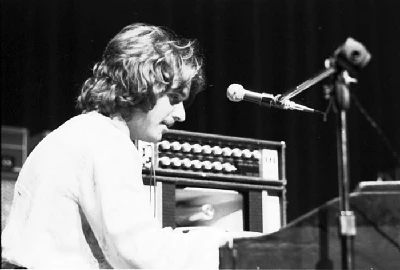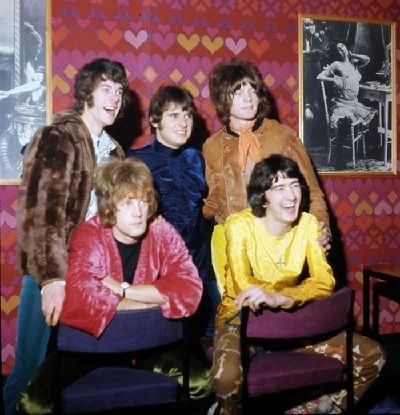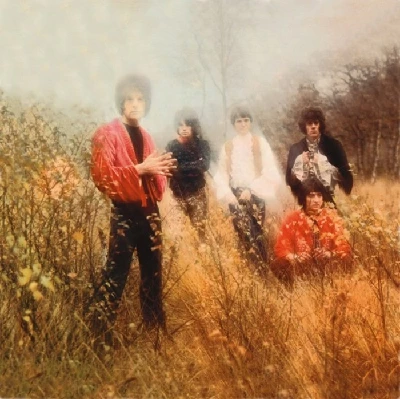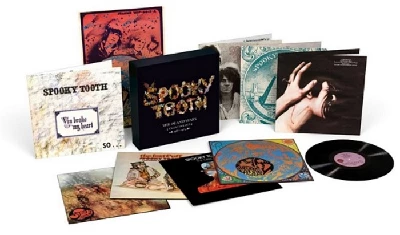published: 19 /
6 /
2015

Gary Wright, singer-songwriter and long-time member of Spooky Tooth, talks to Lisa Torem about his new memoir, friendship with George Harrison and growing spirituality
Article
New Jersey native Gary Wright attended medical school for a spell before deciding to devote his life to being a singer/songwriter and instrumentalist. He performed and recorded with rock band Spooky Tooth from 1967 to 1970 as well as during their reformation in 1972-1974. For Spooky Tooth's "It's All About" and "Spooky Two", the band worked with producer Jimmy Miller. The third album "Ceremony" (1969) was produced and arranged in conjunction with Pierre Henry. The focus on electronic music triggered a change in focus for Wright, who began working on a new direction for his solo career.
He is most well known for the 1976 solo hits 'Dream Weaver' and 'Love is Alive'. In the 1970s and early 1980s, he recorded three albums and after that largely spent time creating world music and film music soundtracks. 'Waiting to Catch the Light' and 'Connected' are two of his more recent works.
Wright played all the keyboard parts, including Mini Moog and harmonium, on the late George Harrison's 1970 album "All Things Must Pass". He identified strongly with the spiritual lyrics of 'My Sweet Lord' and 'Hear Me Lord'. Wright also played on Harrison's 1973 "Living in the Material World". Wright had developed an immediate attraction to Harrison's far eastern-inspired arranging ideas when he first heard 'Within You Without You' from the Beatles' Sgt. Pepper album.
He and Harrison would take two trips to India together and develop a strong, spiritual connection, which lasted until Harrison's death in 2001. Wright reveals much about their personal, spiritual and professional relationship in his memoir, Dream Weaver: Music, Meditation and My Friendship with George Harrison (Tarcher/Penguin Random House, 2014). In the book, he also explained their mutual respect for Yogi Paramahansa Yogananda, whose poetry also deeply influenced Wright's father.
Besides working with Harrison and Spooky Tooth, Wright has also played and/or recorded with Jerry Lee Lewis, Harry Nilsson, B.B. King and the Ringo Starr All-Star Band. In his first Pennyblackmusic interview, he talks about the spiritual issues and musical styles that have deeply informed his career path and sense of well being. He also looks back at Spooky Tooth, which will soon be honoring fans with an extensive box set.
PB: In one of the beginning chapters of your autobiography, you talk about an accident and how that event changed your life and spiritual path. It seemed that you had an epiphany at that point.
GW: I didn't really have an epiphany so to speak. What happened was that it really made me start thinking about, why are we here and the meaning of life. I was brought up as a Catholic, if you're bad you'll go to Hell and those concepts, which I could never really stomach or comprehend. That and the death of my two best friends at the time made me really stop and think, what is the whole thing all about? We're just here for a short time and anyone of us could just get whisked away. And so it planted a seed inside me that was the seed of wanting to find out the deep spiritual answers to our existence, the reason why we're here, what are we doing and what is death all about.
It wasn't really until years later when I met George Harrison, who gave me a lot of these books about Indian philosophy primarily written by Paramahansa Yogananda, whose teachings I went on later in my life to follow, and I've been doing that for about forty years now, so that was really it. George was my mentor in the early days and then I picked up the ball and really went after the spiritual path myself — I started to meditate, but the accident was the trigger, really, that set me searching.
PB: How do you feel you changed or grew between the first trip to India that you took with George Harrison and the second?
GW: The second one, I went in about 1978. I was actually three years on the spiritual path. I had accepted Yogananda as my guru and so I was just starting. I was very fortunate at that trip to have met a saint, a real authentic saint. Her name was Ananda Moyi Ma and I believe I mention that in the book. But they say that when you see a saint or that you're touched by a saint, it's a huge blessing and I felt I got that blessing when I saw her and I met Yogananda's brother. It was a very spiritual trip because India is full of spiritual places where you can go, where people have gone many times to seek God, so those vibrations are there, you can't help but not feel them.
PB: You worked on George Harrison's 'All Things Must Pass' album. Harrison had been so surrounded by a media circus all of his life, that you might have had preconceptions of him, as a person or as an artist. He might have presented himself as "The quiet Beatle" or as a larger-than-life artist with an inflated ego, both stories the press would have made you believe. What were you anticipating and what did you discover when you met George Harrison?
GW: I intuitively thought that he probably would be, from the songs he wrote, but when I met him and was in his physical presence, I was absolutely confirmed. He was a very gentle soul. He cared for people very deeply and he was probably one of the most creative people I'd ever met.
PB: It would be understandable that someone that famous might be guarded; yet he really opened himself up to your friendship.
GW: He did. When he saw I was receptive to his kind of philosophy, he did embrace me; he kind of took me into his fold. Because when I went into the studio and saw all these pictures of Indian saints and incense burning, I thought, 'Wow, that's really cool. I'd never seen that before.' He saw that and he started to talk to me about India and about different spiritual things and he kept giving me incense and books to read and invited me out to his house. We'd spend long weekends there and really that's how the whole thing started.
PB: How do you feel you influenced each other musically?
GW: I think he influenced me by his whole approach to music when he wrote songs, which is to keep them very simple, but make the lyric really unusual and different. All of his songs had unusually different lyrics and his whole approach to writing was simple and when we got into the studio and started to record, he kept everything dead simple, really, really simple on the tracks, so that the song would really shine out. So those ideas definitely I ingested and made a part of my creative spice rack.
PB: 'Dream Weaver' is one of your biggest commercial hits. Wasn't it based on a poem by Yogananda?
GW: Yes, it was a poem called 'God, God God' and the lines were: 'When at night my mind weaves dreams, with threads of sacred memories on that magic cloth, I do emboss the words, God God God.'
PB: This is a song that people of all ages know by heart. It's intergenerational.
GW: I was very fortunate and blessed that it's got a really long life to it.
PB: There's a Spooky Tooth box set coming out and it sounds like quite a generous offering. Can you suggest any songs from that era that stand out?
GW: The most popular ones that radio played a lot were, 'Better By You, Better Than Me'. 'Evil Woman', 'Tobacco Road', Sunshine Help Me', 'Waiting for the Wind' and 'That Was Only Yesterday'. Those were the ones that I think people really latched on to.
PB: Regarding 'Better By You, Better Than Me' – Judas Priest recorded it and there was a tragedy and subsequent court case associated with it when two teenage boys said they heard subliminal messages on the track. That must have been shocking news.
GW: It was one of those instances when someone was trying to get some kind of legal settlement; I think it was the parents of the kid who committed suicide. It was one of those things that people try to get something out of it, but certainly I didn't see anything in the lyric that would have tempted somebody to commit suicide. It had nothing to do with that at all, but I think the lead singer of Judas Priest said something like,
"'Do it. Do it" in the song or something like that and that's where I think his family thought, well, that was a message. It's kind of crazy.
PB: Is that the dark side of celebrity? You start out writing something very beautiful or philosophical and then sometimes weird things happen that you can't predict, that you can't control.
GW: You open yourself up to that kind of stuff when you're a celebrity, it's true, and people will always try to make a play where they can get some kind of a settlement.
PB: How would you describe your songwriting strategy?
GW: It hits me when it hits me. Usually I'm more inspired to write when I'm away from home and all the responsibilities that go with being a homeowner.
PB: I can relate to that.
GW: The sprinkler system breaks. You're constantly having to deal with stuff like that and usually when I go away, I'll bring my acoustic guitar and that's usually a good time for me to write.
PB: And are you mostly writing on guitar these days?
GW: I've always written on guitar and sometimes piano. It's a mixture of both. I like to mix it up so that I don't get stuck in one kind of thing. Writing on guitar, I'm not a guitar player but I can play with open tunings and then come up with some unusual kinds of chord structures.
PB: I saw some footage of you playing the keytar with the Ringo Starr All-Star Band and totally engaging with the audience. Were you one of the first musicians to use that instrument?
GW: I was. Edgar Winter had it like a year or so before me. He used a cut down keyboard with 'Frankenstein', but I was the one, really, to pioneer the usage of it on records with Mini Moog. I was the one to really use Moog bass a lot and after I did that, a lot of other people started to play it. I think, Stevie Wonder, at the same time, we were kind of, Edgar, Stevie and I, were kind of all around the same time, starting to use it.
But I was the first artist, I think, to have done an all keyboard album and to go on the road with an all keyboard band, so I kind of pioneered the usage of that.
PB: You were quite in demand in the studio because of that. You broke away from the guitar-centered phenomenon that drove rock.
GW: Oh, yeah, very much so. It actually worked to my advantage because what happened was that every time they played like 'Love is Alive' on the radio or 'Dream Weaver' the disc jockeys would say, 'There were no guitars on that track. No guitars'. That was a big marketing thing.
PB: Now in regards to that keytar. The traditional keyboard doesn't allow the singer to interact that much with the audience, but the keytar does. Is it a liberating instrument for that reason?
GW: Totally. It was great to be directly in front of the audience and walking around onstage with my keyboard. I loved it.
PB: What prompted you now to write the book?
GW: You know, it's funny. I had thought about writing the book, but I'm not a writer. I couldn't do that and a lot of my friends said, 'You have so many rich experiences to share with people. You should put them down in a book', so I finally thought to myself, 'Well, I write my own lyrics. That's more like poetry because you're limited by rhyme and meter, whereas in a book you can write prose, you can write sentences in paragraph form, it doesn't matter. So I decided to start doing it and I put a proposal together, gave it to my literary agent and he liked it and didn't think I even needed to have a ghostwriter. They started shopping it around and of the two deals that I was offered, I went with Penguin Random House. They didn't want me to use a ghostwriter, either. They wanted me to write the book - and I did, and it was a really, enjoyable process.
It took me a couple of years to do it, but I'm glad I did it because it documented my life for future generations with my family and it gave me the opportunity to tell my story to young musicians and people in general and it was really about keep on keeping on even when you're like in the midst of failure, when you're down and you're troubled, if you can keep that spirit of being positive alive, it's important and you'll ultimately succeed if you keep on trying. I really believe that, that successful people are people that fail 90 percent of the time, but have the ability and the stamina to try it one more time.
PB: That's a very useful and optimistic perspective, Gary. Looking back at the professional side of your life, what has been the most rewarding part?
GW: I think the obvious one was when 'Dream Weaver' had that huge success in the summer of 1976 when I was on tour with Peter Frampton and Yes and played before probably about three million people during that whole summer. That's kind of on the outward side of it, but on the inward side, I would say, that the most rewarding thing for me personally, was when I would get a letter or somebody would come up to me after the show and say, 'Your music helped me over a very difficult period in my life. I was going to kill myself but I kept playing your album over and over and it saved me from that', and I thought, that's what making music and art is really all about. It's a process of helping people.
PB: At one point in your early life, you had thought about completing medical school, which you attended for a time, but you didn't finish. You didn't become a doctor. Still, you ended up becoming a healer...
GW: A musical healer.
PB: What are your upcoming performance and recording plans?
GW: I'm not really sure what they're going to be. I'm thinking about going to promote my book and doing some lecture tours where I talk about the book, because I feel I can do that now. I'd like to do that because I've done music for so long. I would probably mix it up, it would be part music and part talking and I'm also now starting a new EP that I'm going to be putting out.
PB: How would you describe the music that will be on it?
GW: I'm not sure yet, because I haven't started out the actual production of it, but it's probably going to be more orchestral oriented. I'm just writing songs now.
PB: Do you find that writing now feels differently than earlier in your career?
GW: Well, yes, because I think I'm a more accomplished musician than I was back then, but there were some great things back then. What was really cool when I did the "Dream Weaver" album was that I was really unafraid to take chances. When I wrote all the songs and put them down in my little studio with no guitars, but just with a Clavinet and a Fender Rhodes, a harp string ensemble and a drum machine and a Mini Moog, I thought, this sounds kind of cool without guitars.
I played it to somebody from Warner Brothers and he agreed, so I did the album without any guitars. I didn't purposely say, I'm going to do the sound with no guitars, it was just something that happened. It will happen again. I think the last album I did, "Connected" was one of the best albums I've ever done. I think the production of it, when I finally finish all the tracks will dictate the musical direction of the album, but it will be me, my voice and my songs so that part will be the same.
PB: Tell me one dream that you would like to weave for the universe.
GW: My dream would be for people to try to unstress out and not be so the victim of technology and stress, learn to meditate, learn to practice peace and love, as Ringo says, in their lives. That's real important and I think it's a matter of people becoming more spiritual and not let it happen through having to suffer so much but to start thinking more about others, and to put themselves second.
PB: That's a nice sentiment. What was it like, working with Ringo?
GW: It was great. It was wonderful. It was a wonderful, wonderful experience. Looking back when I was singing 'Dream Weaver' and seeing who was playing the drums, it was great. And he was such a wonderful, generous, lovely human being to work with.
PB: If you could jam with any musicians, living or dead?
GW: Joe Walsh, Prince, Stevie Wonder, Peter Gabriel, Ringo. Terry Bozzio, Larry Graham.
PB: That sounds like a sensational lineup, Gary. It would be really something to hear that happen. Thank you so much for your time today.
GW: Thank you.
Band Links:-
http://www.spookytooth.sk
http://www.thedreamweaver.com/
https://www.facebook.com/GaryWright.Th
http://en.wikipedia.org/wiki/Spooky_To
http://peel.wikia.com/wiki/Spooky_Toot
Picture Gallery:-


